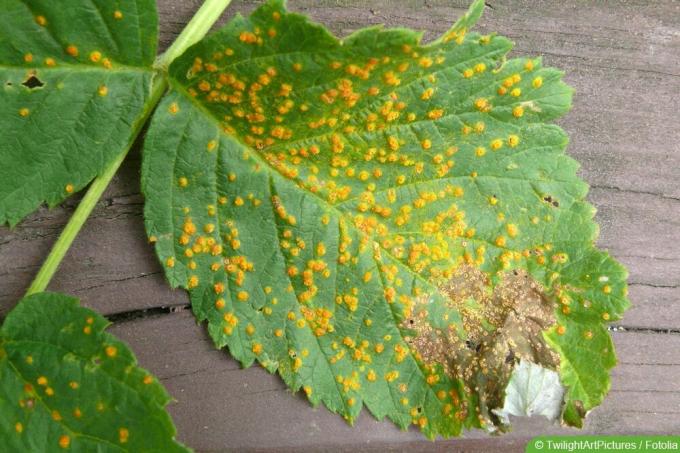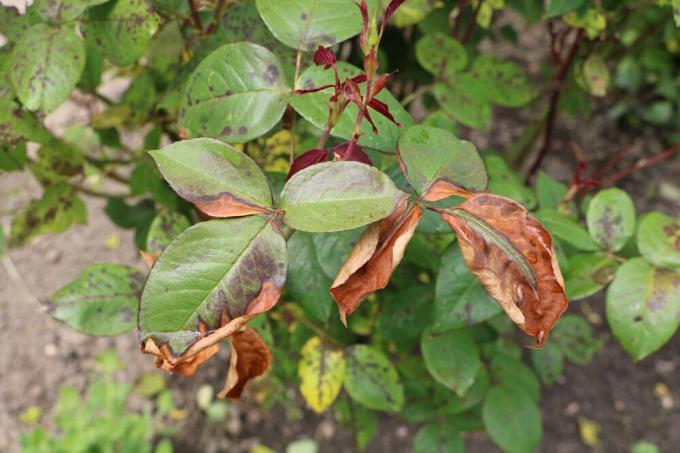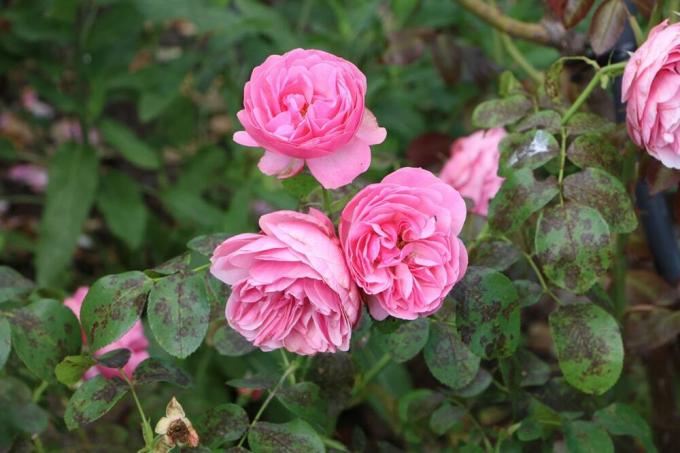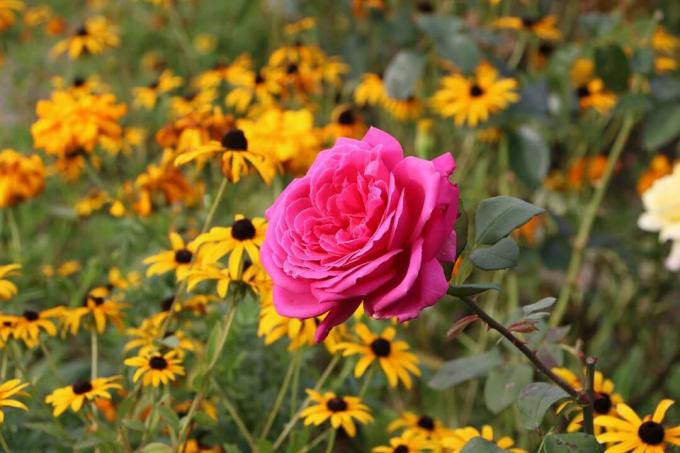

Table of contents
- Recognize
- consequences of an infestation
- Combat rose disease
- Organic home remedies
- Prevent
- Only plant roses with the ADR seal
- Ensure good ventilation
- Water only in the root area
- Plant garlic and fertilize properly
The seductive splendor of the roses in your own garden is quickly gone when the plants are attacked by the so-called rose rust. This is a fungal disease that can affect roses not only visually. If an infestation is detected, action should be taken quickly. However, prevention is better than fighting. And that's where it can help to only plant certain roses.
Recognize
The so-called rose disease in Central Europe is mainly caused by two fungi, Phragmidium mucronatum and Phragmidium tuberculatum. They can penetrate into the molecular structure of the leaves in particular and then inevitably lead to optical changes on the top and bottom of the leaf. These changes are relatively easy to spot. Small yellow-red spots usually appear on the upper side of the leaf, while at the same time yellow-orange pustules the size of a pinhead can be seen on the underside of the leaf. If both characteristics occur together, then rose disease is clearly present. It is therefore always necessary to look at the leaves from both sides in order to recognize them. A magnifying glass can be very useful for this.
Tip:
If possible, roses and especially their leaves should be checked several times a week for unnatural changes. Of course, this check can also be carried out on a random basis.
consequences of an infestation
While rose rust is one of the most common diseases affecting roses, it is also relatively harmless to the plant. Most of the time it only leads to optical impairments on the leaves. However, since the appearance of roses plays a major role, this fungal attack can quickly spoil the joy of the plant. If there is a particularly severe infestation, there is sometimes a complete loss of leaves. However, such severe fungal infestation is extremely rare. However, if it is not fought immediately, this can have dramatic consequences for the rose bush, even dying.
Combat rose disease

A fungal infestation on the rose bush can be treated with specially developed products from specialist retailers. These agents can be both chemical and biological. However, it is not necessary to go to the specialist market. Rose disease can be counteracted at least as well with home remedies that everyone has easy access to. They also cost less and are usually much more environmentally friendly. Only when there is a very severe infestation will there be no avoiding the use of chemical substances. Experience has shown that in most cases it works without it. Incidentally, the control is always based on the fact that the fungus that has attacked the plant is destroyed.
Organic home remedies
The rose rust can be combated excellently and very effectively with biological home remedies. Above all, three remedies have been recommended that can be mixed relatively quickly and are very easy to use.
1. Cooking oil/detergent mixture
- Mix 100 milliliters of cooking oil with two packets of baking powder and a few drops of washing-up liquid
- Pour in three liters of warm but not boiling water
- Mix well with a clean wooden spoon and allow to cool further
- Put parts of it in a spray bottle and spray the entire plant with it
- Don't forget the undersides of leaves and branches
2. Horsetail manure
- Fill up one kilogram of fresh field horsetail leaves with ten liters of cold to lukewarm water
- allow the mixture to infuse for at least 24, preferably 48 hours
- then filter with a linen cloth or a fine sieve
- then dilute to about ten percent with clear water
- use the diluted liquid manure as irrigation water
- water and spray the affected plant at least every two weeks
3. garlic broth
- Finely chop 300 grams of garlic
- Pour ten liters of boiling water over it
- let the mixture steep for about half an hour
- then filter with a clean linen cloth or fine sieve
- let the infusion cool down further
- then spray the plant with the mixture every two weeks

Incidentally, horsetail liquid manure is also suitable for preventive use. If you water the roses regularly, the likelihood of a fungus taking root in the plants decreases. Consequently, there is no rose rust. The manure can also be an important protection against other diseases. Above all, it provides excellent protection against the dreaded powdery mildew.
Tip:
Regardless of which remedy you choose, infested leaves should always be removed and disposed of in the trash. Under no circumstances should leaves that have already fallen off be left under or near the plant.
Prevent
It is a well-known fact that the best illness is the one you don't get in the first place. This applies to us humans, but also to animals and plants. Prevention is therefore always better than cure. There are a number of measures to protect the roses in the garden from rose disease. Here are the main ones:
Only plant roses with the ADR seal
Roses that have an ADR seal are generally much less susceptible to diseases. ADR stands for "General German Rose Novelty Test". These are particularly resistant and very robust breeds. It is therefore advisable to only plant roses that are allowed to bear this seal. This does not mean a 100% guarantee and does not mean that they are protected against fungal infections would be resistant, but they are much less likely to develop it.
Ensure good ventilation
In order for a fungus to be able to spread in a rose bush, it needs a rather humid and warm climate. Consequently, it makes sense to plant the rose bushes in such a way that they are always well ventilated. So they shouldn't be too close together either. The wind will then ensure that wet leaves dry very quickly.
Water only in the root area

Drops of water on the leaves promote fungal infestation. If the roses are watered, the watering should therefore always be carried out directly in the root area. Watering from above is therefore strictly prohibited. However, sometimes it cannot be avoided. If this is the case, then be sure to water in the morning so that the leaves can dry well again during the day.
Plant garlic and fertilize properly
Knoblich does not only work wonders for us humans. It can also protect roses from fungal attack. Certain substances it contains act as a kind of natural fungicide. Garlic plants among the rose bushes may not look the best, but they can provide effective protection. Finally, the right fertilizer is also an important preventive measure against rose rust. The following applies here: only add a small amount of nitrogen at all times.
 garden editorial
garden editorial I write about everything that interests me in my garden.
Learn more about roses

What goes with roses: 30 beautiful rose companions
The beauty of roses really comes into its own when surrounded by the right companion plants. It is important for rose companions that they have similar requirements to roses. We tell you what goes well with roses.

Rose soil: mix soil for roses yourself | composition
The rose is considered the queen of flowers and she is very demanding. When it is newly planted, the soil should therefore be optimally prepared. Special rose soils are particularly suitable for planting. How to make them yourself is in this post.

Rose cuttings: 8 tips for propagating roses
Roses can be propagated quite easily with the help of cuttings if the site conditions and the preparation are right. Both the time and the care play an important role in ensuring that the rose shoot takes root successfully and then thrives magnificently.

Combat rose pests | 10 typical pests on roses
Roses are the pride of many ornamental gardens. But in addition to diseases, pests also give you trouble again and again. Anyone who knows how to recognize and fight them can easily and quickly protect their darlings from most dangers.

Rose care in spring | 5 tips for the new season
The rose, the queen of flowers, should not be missing in any garden! If you want to enjoy the blooming splendor of bedding, hedge and climbing roses in summer, you have to start caring for the roses in spring. We have put together the most important information for you.

Caterpillars and Bugs on Roses: Spotting 16 Common Pests
Roses, the queen of flowers, impress with a variety of species and varieties. Their care is easy to difficult. This is in the eye of the beholder. However, care mistakes are only a danger for roses, because they are also popular with numerous pests.

